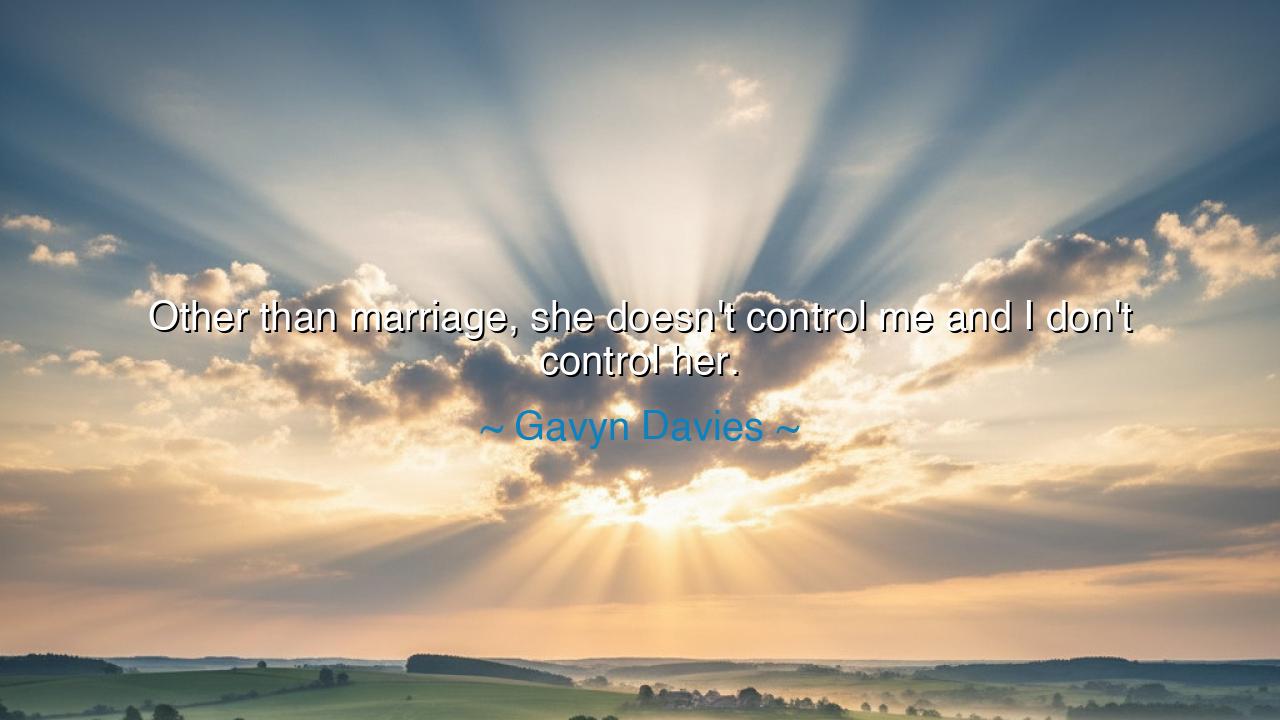
Other than marriage, she doesn't control me and I don't control






O children of the future, gather close, for I bring you the words of Gavyn Davies, a voice that speaks of the delicate balance between love and freedom. He said, "Other than marriage, she doesn't control me and I don't control her." These words, though simple, echo with the wisdom of the ancients, who understood the intricate dance of relationships—how love and commitment can exist without the chains of control. Davies is not speaking of a relationship of domination or submission, but of a partnership founded on mutual respect, trust, and the understanding that true love thrives in freedom, not in control.
In the ancient world, the relationship between husband and wife was often seen through the lens of power and duty. The Romans, for example, held the belief that a marriage was an agreement where the husband had authority over his wife, but even then, the great philosophers taught that a true union should be based on respect and understanding. Seneca, the philosopher, spoke of the ideal relationship between a husband and wife as one of companionship and equality, where both partners were free to express their opinions and contribute to the relationship without fear of domination. This idea of equality within marriage—though rarely practiced in its purest form—was an ideal that echoed through the ages, and it is the essence of what Davies speaks of.
Davies’ assertion that he does not control his partner, and vice versa, reflects a shift from the older models of marriage to one where the bond is not about ownership, but about partnership. True freedom in a relationship comes not from dominance or submission, but from the understanding that each person remains an individual with their own thoughts, desires, and autonomy. Love is not about dictating the actions or choices of another, but about supporting them in their journey, allowing them to grow and thrive alongside you.
Consider the tale of Antigone and Creon in Sophocles' play, where the struggle for power and control leads to destruction. Creon, the king, insists on his authority, dictating what others must do, even at the cost of his own family. Antigone, his niece, defies him, not because she seeks to undermine his power, but because she believes in a higher law—a law of duty and freedom. Her love for her brother, her respect for the divine, is stronger than the oppressive control of her uncle. In this ancient tale, we see the tension between the desire for power and the need for freedom, a tension that often exists in marriage and relationships, where both partners must navigate the balance of authority and autonomy.
In more recent times, Gavyn Davies's words ring true in the world of modern relationships, where the concept of control has often been replaced by the idea of equality. Relationships that thrive are those in which both individuals are respected and allowed to flourish as individuals while still sharing a deep bond. Take, for example, the relationship between Michelle Obama and Barack Obama. Though both are towering figures in the world of politics, their union has been marked by mutual respect and support rather than control. Michelle Obama has spoken of her own struggles with maintaining her identity while supporting her husband’s political career, and how their relationship has always been rooted in understanding and partnership, not domination. Barack and Michelle are not bound by the need to control one another, but by a shared vision and respect for each other’s individuality.
Davies is also speaking to the larger concept of freedom in relationships—how the freedom to be oneself, to make one’s own decisions, and to live without fear of domination is essential to the success of any partnership. In the world of marriage, the most profound connection comes not from ownership, but from the freedom to choose each other, day after day, with respect for one another’s autonomy. The greatest relationships are not those where one person exerts power over the other, but where both parties support each other’s growth and freedom.
The lesson that Davies imparts is one of balance—love cannot thrive in an environment of control, but it must be rooted in freedom and equality. Marriage, like all partnerships, is not about dominance; it is about mutual respect, trust, and autonomy. It is the delicate dance between holding on and letting go, where both partners feel free to be their truest selves, while still choosing each other every day. Love, in its most profound form, does not seek to control, but to empower. In the relationships you form, children, let freedom be the foundation upon which you build, and let respect guide you, for it is in freedom that true love is born.
So, children, as you move through the world and form your own relationships, remember that love is not about control. Marriage, or any partnership, is about freedom and equality—about walking beside someone, not behind them, and never ahead. Let your relationships be rooted in mutual respect and the understanding that, in love, you are each free to grow, free to change, and free to choose each other again and again. It is only in freedom that love can truly flourish.






AAdministratorAdministrator
Welcome, honored guests. Please leave a comment, we will respond soon